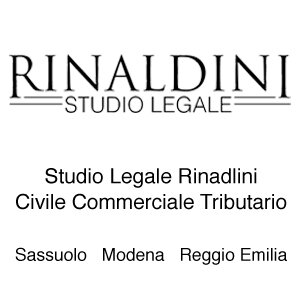Best Due Diligence Lawyers in Sassuolo
Share your needs with us, get contacted by law firms.
Free. Takes 2 min.
List of the best lawyers in Sassuolo, Italy
About Due Diligence Law in Sassuolo, Italy
Due diligence is the systematic legal, financial, tax, regulatory and technical review carried out before a transaction or major business decision. In Sassuolo - a municipality in the province of Modena, Emilia-Romagna known for its ceramic industry - due diligence is governed primarily by Italian national law but also shaped by regional and local rules. Whether you are buying real estate, acquiring a company, investing in a local factory, entering a lease, bidding in a public tender or lending to a business, due diligence helps identify legal risks, liabilities and compliance gaps so you can negotiate protections or walk away from an unacceptable deal.
Why You May Need a Lawyer
Lawyers with local experience are essential for effective due diligence for several reasons:
- Interpreting law and regulations: Italian law includes civil, administrative and criminal provisions that can affect a deal. A lawyer explains legal consequences and applicable remedies.
- Accessing and analysing documents: Lawyers request and interpret corporate records, land registry entries, notarial deeds, public filings and court records that are key to assessing risk.
- Identifying hidden liabilities: Legal counsel can uncover contractual obligations, employee claims, pending litigation, administrative sanctions, mortgages, easements, environmental liabilities and tax exposures.
- Coordinating specialists: Complex transactions often require accountants, technical surveyors, environmental consultants and notaries. A lawyer manages the legal aspects and integrates specialist reports.
- Drafting protections: Lawyers prepare confidentiality agreements, letters of intent, representations and warranties, indemnities, escrow arrangements and clauses to allocate risk in purchase agreements.
- Handling local procedures: Many matters require interaction with Comune di Sassuolo, Camera di Commercio di Modena, Agenzia delle Entrate, Conservatoria and regional authorities. Local lawyers understand these processes and timelines.
Local Laws Overview
Key legal areas and local institutions to consider when conducting due diligence in Sassuolo:
- Property and land-use law: Check the land registry (Conservatoria dei Registri Immobiliari) and cadastre (Catasto) for title, mortgages and liens. Verify building permits and urban planning compliance with the Comune di Sassuolo's planning documents - local zoning plans, Piano Regolatore or equivalent urban planning instruments - and confirm conformity with the building permit system including CILA, SCIA and permesso di costruire.
- Notarial formalities: Transfers of real estate and certain corporate acts require a notaio (notary). Notarial searches and a review of past deeds are standard parts of property due diligence.
- Corporate and commercial law: Request company documents via the Registro delle Imprese at the Camera di Commercio di Modena - certificate of incorporation, visure camerali, statute, shareholders agreements, minutes, contracts, financial statements (bilancio) and filings. Check for pending bankruptcy or insolvency proceedings at the Tribunale di Modena.
- Tax and social security: Review tax filings with the Agenzia delle Entrate and social security positions with INPS and INAIL for unpaid contributions or liabilities. Local taxes such as IMU and TASI may impact real estate deals.
- Employment and labor law: Examine contracts, collective bargaining agreements, ongoing labor disputes, accrued benefits and potential liabilities for severance - especially where plant transfers or workforce restructuring are involved.
- Environmental and permitting rules: Emilia-Romagna and local authorities enforce environmental laws. For industrial activities - including ceramic manufacturing common in the area - environmental authorizations, waste management procedures, emissions permits and possible contamination liabilities must be checked. ARPA Emilia-Romagna handles monitoring and technical assessments.
- Health and safety: Verify compliance with workplace safety obligations and any outstanding administrative fines. INAIL records and DUVRI-based documents are relevant for construction or industrial sites.
- Sector-specific regulations: The ceramic tile industry and related manufacturing may have specific regulatory regimes - permits for emissions, hazardous substances, waste classification and industrial plant authorizations such as AIA where applicable.
- Data protection and anti-corruption: Check GDPR compliance for processing personal data and the companys 231/2001 compliance program - models for administrative responsibility of entities - and internal anti-corruption procedures where relevant.
- Public procurement and concessions: If the deal involves contracts with public authorities or concessions, the Public Contracts Code and local procurement rules apply and require careful review.
Frequently Asked Questions
What types of due diligence are commonly performed for business transactions?
Common types include legal due diligence, financial due diligence, tax due diligence, commercial/market due diligence, environmental due diligence and technical/engineering due diligence. Legal due diligence focuses on corporate records, contracts, litigation, regulatory compliance, employment and property rights.
How do I start due diligence on a property in Sassuolo?
Start by obtaining a visura ipotecaria and cadastral documents to confirm ownership, mortgages and liens. Request copies of the notarial deeds, planning permits, building certificates of conformity, and ask the Comune for zoning and urban planning information. Engage a local surveyor and a lawyer to review documents and check for irregularities.
What documents should I ask for when buying a local company?
Key documents include the visura camerale, articles of association, shareholders agreements, financial statements, tax returns, employee contracts, major commercial contracts, lease agreements, permits and licenses, litigation files, insurance policies and any environmental or safety certifications.
How long does a typical due diligence in Sassuolo take?
Timeframes vary with complexity. A basic legal due diligence can take 2-3 weeks. More complex transactions - involving environmental assessments, cross-border issues, or many documents - can take several months. Local administrative requests and searches can affect timing.
Who pays for due diligence - buyer or seller?
Generally the buyer pays for due diligence costs. In some negotiated situations, costs may be shared or partially reimbursed if the transaction completes. Costs for mandatory public filings or certifications may be borne as agreed between parties.
Can I rely on public records alone for property due diligence?
No. Public records are necessary but not always sufficient. You should also verify physical conformity of buildings, outstanding administrative orders, unauthorized works, tax positions and environmental issues. Technical inspections and site visits are important complements to public searches.
What are the main risks if I skip due diligence?
Risks include undisclosed debts or mortgages, unresolved litigation, tax liabilities, regulatory violations, environmental contamination, non-compliant construction, employee claims and loss of commercial rights. These exposures can lead to financial loss, fines or invalidation of parts of the transaction.
Do I need a local lawyer in Sassuolo or is a national firm sufficient?
Both can be appropriate depending on the transaction. A national firm may handle complex cross-border matters, but a local lawyer offers practical knowledge of Comune procedures, local industry practices and relationships with regional authorities. For many deals, combining national and local expertise is optimal.
How should findings be reflected in the purchase agreement?
Findings typically lead to specific warranties and representations, indemnity clauses, price adjustments, escrow or holdback arrangements, conditions precedent, and termination rights. Material adverse findings may be used to renegotiate price or to require remedial steps before completion.
Is environmental due diligence important in Sassuolo?
Yes. Industrial activities in and around Sassuolo, including ceramics and manufacturing, can involve pollution, waste and emissions. Environmental liabilities can be significant and long-lasting. A qualified environmental consultant and a legal review of permits and historical use are essential.
Additional Resources
Important institutions and resources to consult during due diligence in Sassuolo:
- Comune di Sassuolo - urban planning and building permits.
- Camera di Commercio di Modena - Registro delle Imprese and corporate filings.
- Conservatoria dei Registri Immobiliari and Catasto - property title and cadastral records.
- Agenzia delle Entrate - tax positions and cadastral information.
- Tribunale di Modena - insolvency records and court filings.
- ARPA Emilia-Romagna - environmental monitoring and technical guidance.
- Provincia/Regione Emilia-Romagna - regional permits and industrial authorizations.
- Soprintendenza per i beni culturali - heritage constraints and archaeological checks.
- INPS and INAIL - social security and workplace safety records.
- Guardia di Finanza - for investigations related to tax or financial crimes where relevant.
- Local notaries and commercialisti - for notarial deeds, tax advice and accounting due diligence.
Next Steps
If you need legal assistance for due diligence in Sassuolo follow these steps:
- Prepare a brief - gather basic information about the target asset or business: names, addresses, type of transaction, timescale, and any known issues.
- Request an initial consultation - speak with a lawyer experienced in Italian and Emilia-Romagna local practice to assess scope and risks.
- Define scope and team - agree the scope of due diligence and identify needed specialists - accountant, technical surveyor, environmental consultant and notary.
- Sign confidentiality agreements - protect sensitive information early with a non-disclosure agreement.
- Deliver document checklist - provide or request a due diligence checklist to collect corporate, tax, property, employment, environmental and contractual documents.
- Commission searches and inspections - instruct the lawyer to obtain registry and notarial searches and arrange site inspections and specialist surveys.
- Review findings and plan remedies - analyze results, negotiate contractual protections, remediation plans, price adjustments or conditions precedent.
- Finalize transaction documents - instruct your lawyer to draft or review purchase agreements, warranties, indemnities and closing documents and to coordinate with the notaio for closing where required.
- Keep records - maintain copies of all due diligence reports and filings for ongoing compliance and post-closing integration.
Engaging a local legal specialist early reduces surprises and strengthens your negotiating position. If you are unsure where to start, ask for a short scoping meeting to obtain a tailored checklist and an estimated timeline and cost for the due diligence process.
Lawzana helps you find the best lawyers and law firms in Sassuolo through a curated and pre-screened list of qualified legal professionals. Our platform offers rankings and detailed profiles of attorneys and law firms, allowing you to compare based on practice areas, including Due Diligence, experience, and client feedback.
Each profile includes a description of the firm's areas of practice, client reviews, team members and partners, year of establishment, spoken languages, office locations, contact information, social media presence, and any published articles or resources. Most firms on our platform speak English and are experienced in both local and international legal matters.
Get a quote from top-rated law firms in Sassuolo, Italy — quickly, securely, and without unnecessary hassle.
Disclaimer:
The information provided on this page is for general informational purposes only and does not constitute legal advice. While we strive to ensure the accuracy and relevance of the content, legal information may change over time, and interpretations of the law can vary. You should always consult with a qualified legal professional for advice specific to your situation.
We disclaim all liability for actions taken or not taken based on the content of this page. If you believe any information is incorrect or outdated, please contact us, and we will review and update it where appropriate.









